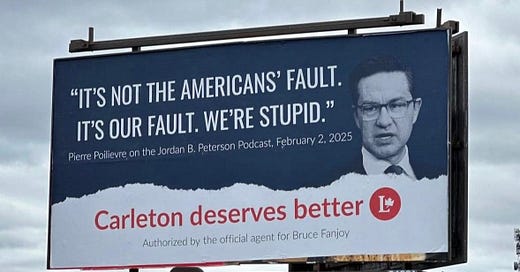Yes… Sadly, He Really Did Say We’re Stupid
A moment of candor, and a troubling view of the Canadian public.
During the English-language leaders’ debate, Mark Carney claimed that Pierre Poilievre had called Canadians stupid. I assumed it was a bit of rhetorical inflation—something loosely paraphrased, maybe implied, not actual words. It sounded too blunt, too self-defeating, to be real.
Then, yesterday, I came across the now-viral billboard image bearing the quote: “It’s not the Americans’ fault. It’s our fault. We’re stupid.” The words were clear, attributed directly to Poilievre.
So I decided to see and hear for myself what he actually said—I went to the source. I pulled up the Jordan Peterson podcast episode and watched. And there it was. Not softened or qualified, delivered plainly. He really said it.
The remark—“It’s our fault. We’re stupid”—was made in the context of a broader lament about what he calls the “pathetic story” of Canada’s trade surplus. But even with that framing, the language Poilievre chose was startling in its contempt and self-righteousness. It wasn’t a policy critique—it was a crass, sweeping indictment, offered with a shrug and a smirk.
These words are more than just a gaffe. It’s a revealing window into the psychology and political ethos of a man who aspires to lead Canada, made particularly stark as we approach the climax of a federal election campaign. Leadership is always as much about humility, compassion, and decency as it is about confidence and certainty. Poilievre, in this moment, appears disturbingly deficient in the former and disproportionately endowed with the latter.
First, Poilievre’s tone betrays a deeply embedded arrogance that’s troubling in any leader, particularly one seeking national unity and trust.
During his conversation with Peterson, Poilievre made another startling comment—proudly noting, perhaps unwittingly, that his views have remained unchanged since his teenage years. His eagerness to call others stupid, with all the zeal of a teenage ideologue, certainly supports this. But far from demonstrating principled conviction, this admission suggests intellectual stagnation—a refusal or inability to evolve or adapt.
As philosopher Martha Nussbaum argues, intellectual humility is essential for democracy because it allows for the acknowledgment of one’s limits and the legitimacy of differing perspectives. Nussbaum insists, “Democratic deliberation requires humility because it necessitates genuinely hearing opposing views, not simply dismissing them as inferior or foolish.”
Poilievre’s self-certainty is dangerously close to the hubris of the eternally self-righteous undergraduate—unwilling or unable to genuinely engage with opposing viewpoints. This mindset doesn’t only hinder constructive discourse; it actively corrodes trust among citizens who must rely on a leader’s openness to evidence, dialogue, and change.
Secondly, the impulsivity demonstrated by Poilievre in dismissing his fellow Canadians as “stupid” reveals a concerning lack of emotional discipline. Aristotle, in his “Nicomachean Ethics,” described true leadership virtue as lying between extremes—neither overly rash nor cowardly but moderate, reasoned, and reflective. Poilievre’s comment, tossed off without caution or restraint, falls short of this Aristotelian ideal. If Poilievre is quick to belittle the intelligence of the very people he hopes will elect him, what does that say about his ability to handle the pressures of leadership, where impulse control and thoughtful deliberation are paramount?
This impulsivity dovetails dangerously with authoritarian tendencies. Poilievre’s disdain suggests an implicit logic: if you believe those you govern are inherently foolish, you naturally conclude that they must be controlled rather than consulted. Political philosopher Hannah Arendt warned of precisely this dynamic in “The Origins of Totalitarianism”: leaders who disdain the populace inevitably gravitate toward force, coercion, and the erosion of democratic norms. Authoritarianism, she cautions, arises from leaders convinced of their singular access to truth, who therefore see dissent not as healthy democratic expression, but as irrational defiance or stupidity, requiring suppression.
But leadership, genuine leadership, especially one seeking to steward a diverse, pluralistic democracy like Canada, demands humility, compassion, and basic decency. As the election looms only days away, Canadians must seriously consider whether Poilievre’s dismissive stance toward his own compatriots aligns with the empathetic governance Canada deserves. Zen Master Thich Nhat Hanh reminds us that true leadership is fundamentally an act of service rooted in compassion, stating, “You can evaluate the quality of your authority by looking deeply to see if compassion is the foundation of your leadership.”
This election is not merely about policy; it is fundamentally about character and democratic ethos. Canada does not need a leader who sees its citizens as stupid or misguided, but rather one who respects their intelligence, listens with humility, and governs with compassion and decency.
Poilievre’s candid moment with Peterson has given voters a clear, unvarnished insight into his character.
It is now up to Canadians to decide whether arrogance and disdain are qualities they can trust or whether humility and compassion are essential foundations for true leadership.





I occasionally wonder how contempt for the public dovetails with a strategy so dependent on disinformation.
This is a party that gains votes among people who support them in large part because they believe things that just aren’t so.
It seems to me maybe this could cut a few ways. They think the public are idiots because they know directly how gullible some are. Or justify to themselves lying because people are too ‘dumb’ to do what they themselves believe the right thing unless they are lied to. If you give us a vote only because we frightened you of scapegoat X dishonestly, fine, whatever.
... mixed in with this, they may at least partially come to believe their own deceptions. This is a hazard of relying on those.
Carleton really deserves better. Go Bruce Fannoy